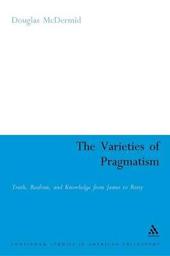
|
The Varieties of Pragmatism
Paperback / softback
Main Details
| Title |
The Varieties of Pragmatism
|
| Authors and Contributors |
By (author) Dr. Douglas McDermid
|
| Series | Continuum Studies in American Philosophy |
|---|
| Physical Properties |
| Format:Paperback / softback | | Pages:208 | | Dimensions(mm): Height 234,Width 156 |
|
| Category/Genre | Western philosophy from c 1900 to now |
|---|
| ISBN/Barcode |
9780826425041
|
| Classifications | Dewey:144.3 |
|---|
| Audience | | Professional & Vocational | |
|---|
|
Publishing Details |
| Publisher |
Continuum Publishing Corporation
|
| Imprint |
Continuum Publishing Corporation
|
| Publication Date |
1 November 2008 |
| Publication Country |
United States
|
Description
For much of the twentieth century, many Anglo-American philosophers supported three theses - one about reality, one about truth, and one about human knowledge - that, taken together, underwrote debates in epistemology. The first was realism: the commonsensical-sounding view that the world of physical objects exists independently of human thought or language. The second was the correspondence theory of truth, according to which true statements or beliefs are those which accurately represent the way the world is. The third was foundationalism: the view that our knowledge of the world, like an edifice, must rest on firm foundations (i.e. on beliefs whose justification does not depend on any other beliefs). In the last two decades, however, a radical anti-epistemology movement led by the influential American philosopher Richard Rorty has put partisans of all three theses on the defensive. Moreover, Rorty has repeatedly claimed that his opposition to the shibboleths of traditional epistemology draws inspiration from the grand tradition of Pragmatism (especially from William James and John Dewey. In this important new book, Douglas McDermid argues persuasively for two key claims: first, that the so-called "Neo-Pragmatist" critique of traditional epistemology is thoroughly unconvincing; second, that Rorty is guilty of taking the name of Pragmatism in vain, since there are crucial and far-reaching differences between Neo-Pragmatism and the Classical Pragmatism of James and Dewey. The Varieties of Pragmatism will take its place in the forefront of the literature on this most vital part of the American philosophical legacy.
Author Biography
Douglas McDermid teaches philosophy at Trent University, Canada. He has published more than a dozen articles in various philosophical journals.
Reviews"McDermid offers a defense of pragmatist arguments against a realist epistemology and the correspondence theory of truth-that a statement is true if and only if it mirrors reality-by briefly examining the arguments of classical writers such as William James, F.C.S. Schiller, and John Dewey, and of neopragmatists Donald Davidson, Hillary Putnam, and Richard Rorty. The volume consists of eight chapters in two sections: "Pragmatism and the Correspondence Theory of Truth" outlines some important pragmatist arguments for and against realism and the correspondence theory; "Neo Pragmatism and Epistemology" defends epistemological realism by challenging the pragmatist arguments for a coherence theory, and Rorty's pragmatist credentials. The epilogue presents a Platonic myth in which the author defends philosophy, objectivity, and reason. Three short appendixes follow on Rorty's conception of truth, Putnam's and Kant's views on the coherence theory, and James's and Dewey's criticisms of the correspondence theory. A general bibliography lists classical and contemporary works to 2003...the book assumes a mastery of the field." -- Choice Reviews "... One could hardly find a better introduction to its subject matter or a more judicious treatment of its themes. It is also a pleasure to read." Ernest Sosa, Brown University * Blurb from reviewer *
|